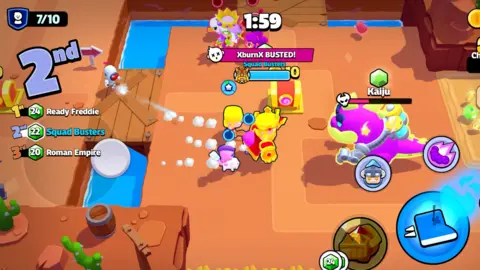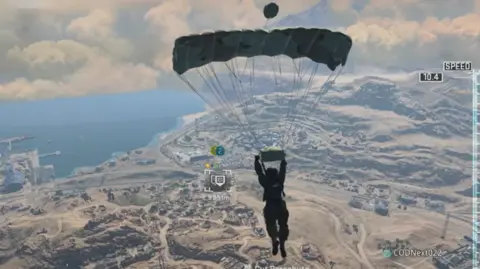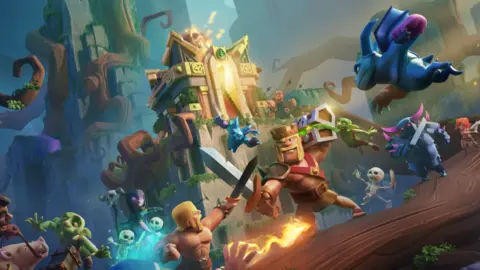Know-how of Enterprise Editor
 Supercell
SupercellFor somebody pushing his firm to interrupt new floor, Ilkka Paananen seems relaxed.
Not carrying footwear, like everybody else within the workplace – it is a Finnish factor I am informed – he tells me the cell gaming trade wants shaking up.
“We have to take greater dangers,” says Mr Paananen the chief govt of Finland’s Supercell – a large on the earth of cell video games.
“Now we have to create new sorts of sport experiences,” he says.
The corporate already has a number of the most profitable cell video games ever launched; final yr Conflict of Clans and Brawl Stars generated more than a billion dollars between them.
Nonetheless, over the previous couple of years Mr Paananen has “considerably” elevated funding in new video games, employed extra workers and arrange new sport studios.
“Now we have a whole lot of very, very gifted, bold groups who’re attempting to reimagine what cell video games would possibly seem like in, say, 2030, and I want I had the reply. I do not, however you possibly can definitely count on several types of sport experiences than you have seen to this point on cell,” he says.
Mr Paananen underlines the necessity for innovation with a statistic; final yr 60% of the time spent on cell video games was accounted for by video games that had been not less than six years previous, and solely 10% of enjoying time was on titles developed previously yr.
And with out thrilling new video games, the trade will wrestle for consideration.
“The competitors for folks’s free time is a lot more durable nowadays. And never solely are you competing towards different video games, however you are competing towards social media, music streaming, video streaming, and many others, all accessible in your cell phone,” he says.
One cause the trade isn’t churning out video games, he says, is the expense. Within the early days, cell video games had been less complicated and cheaper to make than video games performed on consoles and PCs. However not anymore.
“Constructing video games has truly change into much more costly,” says Mr Paananen.
“The primary cause is that the platform [smartphones] lets you do far more at this time than 10 years in the past. And the opposite factor is that the form of a bar is simply approach larger in customers’ minds.”
 supercell
supercellSupercell’s personal manufacturing line has stumbled. Launched final yr, Squad Busters had a robust begin, however has light since then.
“The reality is that it hasn’t met our ambition, not less than not but,” admits Mr Paananen.
In February, Supercell appointed a brand new basic supervisor to Squad Busters.
“The crew has made some actually, actually daring modifications to the sport. And naturally, time will inform,” Mr Paananen says.
Supercell has taken a unique strategy with one other new sport, Mo.co.
The monster searching sport was launched in March, however solely to these with an invitation from Supercell.
“It is laborious to measure what they take into account to be successful with that one… it is nonetheless invite solely and hasn’t actually set the world on fireplace,” says Neil Lengthy, the founder and editor of mobilegamer.biz, and who has been a video video games journalist for greater than 20 years.
“Cellular video games are fairly an excessive enterprise, the place the successes are actually massive, but in addition the failures are actually, actually massive,” he says.
He factors to final month’s determination by video games maker Activision to pull a mobile version of its enormous hit sport, Name of Responsibility.
“They might have spent years creating this sport, after which they launched, it did not work, and it is useless inside a yr… that is why folks aren’t taking dangers, as a result of, you already know, the failures are very seen and dear.”
He additionally factors out that the cell video games trade has modified quite a bit within the years since Supercell launched its hit video games.
There’s far more competitors and a few builders are selecting to not make a giant, splashy launch, and as a substitute tweak video games on the go.
“Perhaps the period of those mega launches is form of over,” says Mr Lengthy.
“Generally it is higher to place your sport on the market after which simply type of construct it as you go and study what gamers like and don’t love,” he says.
 Activision
ActivisionSupercell provides a whole lot of independence to the groups which can be engaged on new video games. In the mean time there are 10 of them with video games in numerous levels of growth.
One among their guiding rules is to create video games with longevity.
“The query that our groups ask themselves is: ‘Why would folks play this sport in 5 or 10 years?’.”
“They’d like to be in the identical class of corporations like, say, Nintendo, for instance. It has been round greater than 100 years.”
Mr Lengthy says on the core of Supercells’ success is an easy precept.
“They take fairly complicated sport concepts and make them very easy and accessible to play, and type of cartoony and enjoyable.”
 Supercell
SupercellLike many companies, Mr Paananen is hopeful that AI will assist spur innovation. At Supercell it is getting used to create new kinds of video games.
“I’ve seen some inner prototypes, but it surely’s tremendous early. I believe it may take a number of years for any individual to invent one thing utterly new on that entrance.
“But it surely’s a kind of issues the place it isn’t a query of if it may occur. It is query of when it may occur and who will make it occur.”
Supercell additionally has its AI Innovation Lab in Helsinki. It is an opportunity for folks exterior to the corporate to experiment with Supercell’s mental property, together with its video games and characters.
“We principally gave them a free hand to do no matter they wished, to be able to spark innovation.
Mr Paananen says it has been a “large success” and one other is deliberate for San Francisco.
“The top end result may not even be a sport, or a sport that you just and I might take into consideration as a sport, but it surely’s utterly completely different expertise enabled by AI.”
Mr Lengthy says AI has been helpful in particular areas, like rushing up sport growth or analysing participant behaviour.
However to this point nothing revolutionary.
“When it comes to creating fully new kinds of video games we have but to see it. And it would not really feel prefer it’s about to occur simply but, however we’ll see.”



